Carne Asada is all about the marinade. You take a nice piece of steak, marinate it with some delicious flavors, and then head out to the grill for the ultimate flavorful piece of beef. This dish is lovingly adapted from the kitchen of one of the world’s most renowned chefs of Mexican cuisine, Rick Bayless, ensuring that while the techniques are adapted for the home kitchens of our audience, the deep, traditional flavors not only remain but shine.
Why Our Recipe
- Adapted from one of the world’s most renowned chefs of Mexican cuisine and made accessible to home cooks.
- We may adjust techniques, but we never sacrifice flavor, ensuring you get restaurant-quality results at home.
- Practical substitutes without compromising the dish’s integrity for when you can’t find everything at your local grocery store or want to play with the flavors.
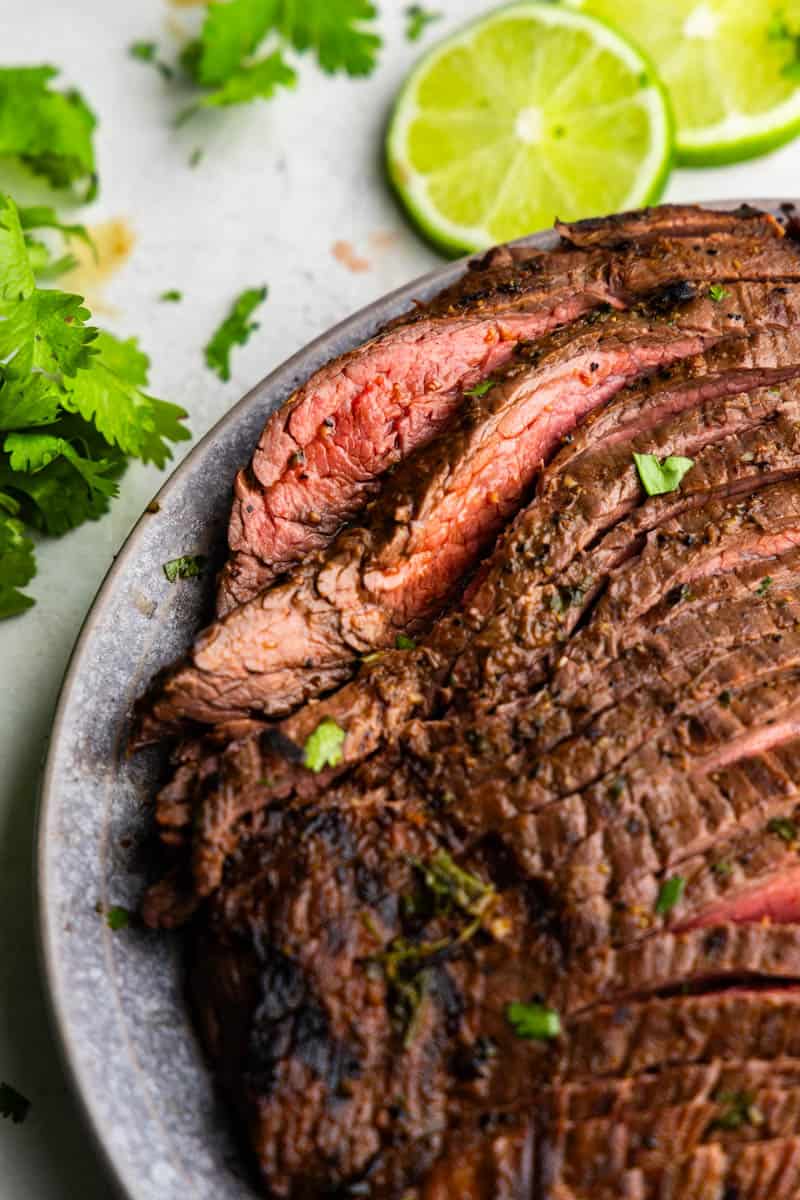
Carne asada means “grilled meats,” but there’s a world of ways to prepare it across Mexico. Our recipe is influenced by the styles popular in regions like Jalisco and Nuevo León, where orange juice is used in the marinade to give the meat a tender texture and a burst of citrusy flavor.
This isn’t just about the great taste you get from grilling; our focus is on a marinade that really brings out the rich flavors and tenderizes the meat to perfection. A great carne asada starts with the right cut of steak. Flank or skirt steak is perfect for soaking up the marinade and grilling up beautifully tender.
Ingredient Notes
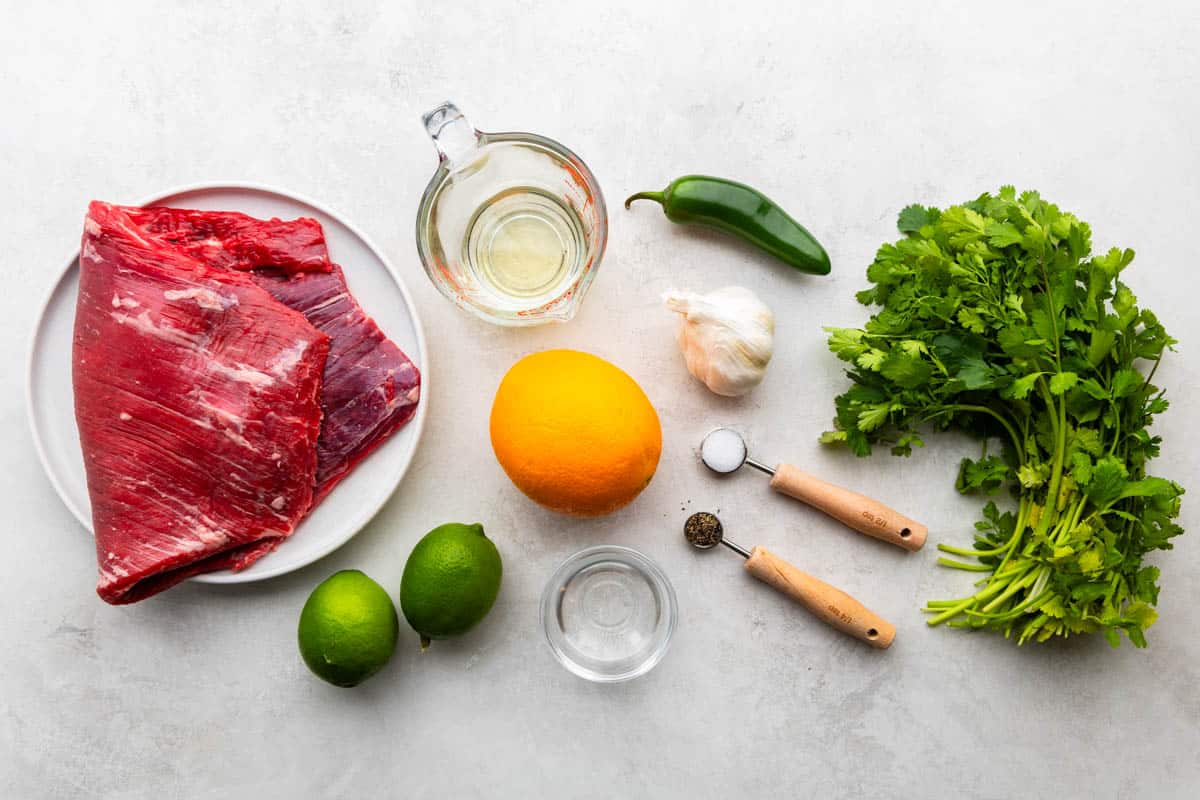
- Flank Steak or Skirt Steak: Both cuts are ideal for Carne Asada due to their rich flavor and texture that becomes tender when properly marinated and grilled. Flank steak is slightly leaner, while skirt steak offers a more intense beef flavor. You can also beef things up with a sirloin or ribeye if you want to get fancy.
- Limes: Fresh lime juice tenderizes the meat and adds a little zesty zing. Lemon juice can work too.
- Garlic: quintessential and delicious. Measure it with your heart.
- Orange Juice: Adds sweetness and citrus notes that balance the lime’s tartness, also helping to tenderize the steak. If orange juice is not available, try substituting with grapefruit juice or a mix of lemon and pineapple juice for a similar effect.
- Cilantro: If cilantro is not to your taste (we know that for some people it tastes like soap), parsley is a trusty fallback.
- Salt and Pepper: Adjust according to taste. You can always add more after cooking.
- Vegetable Oil: Helps to bind the marinade and ensure that it adheres well to the meat, also aiding in the grilling process. Olive oil or avocado oil are excellent alternatives.
- Jalapeño: Use serrano or habanero for spicier meat, and use less jalapeno or substitute with a poblano pepper for less spicy.
- White Vinegar: Apple cider vinegar or additional lime juice can also be used.
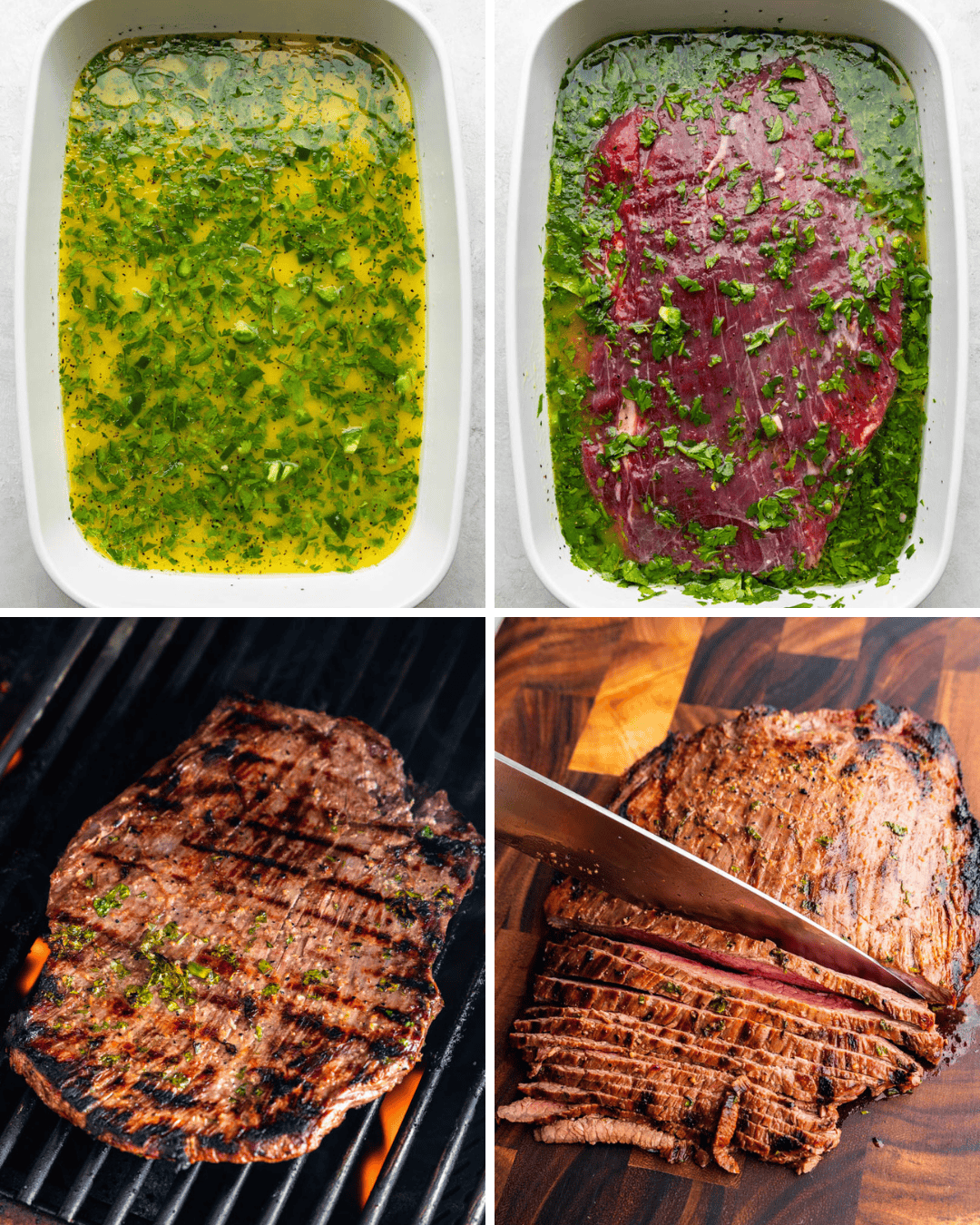
What if I don’t have a grill?
Grilling carne asada on an outdoor grill adds that unbeatable smoky flavor, but not everyone has one handy. Don’t worry—you can still get fantastic results right on your stovetop.
Just grab a griddle or a heavy skillet (cast iron is ideal because it holds heat so well). Crank up the heat high, just like you would with a grill, and turn on the fan on your hood. Place your marinated steak on the hot surface and let it cook for about 5 to 7 minutes on each side.
This will give you a delicious sear and a well-cooked interior. Flip it just once to get that perfect crust. Cooking on a stovetop mimics the high heat of grilling, ensuring your carne asada is just as satisfying, with all the tender, juicy flavors intact.
Marinating Time
Minimum Time: At least 2 hours. This gives the marinade enough time to start working its magic on the meat, tenderizing it and starting to layer in the flavors.
Ideal Time: Overnight. Letting your steak marinate overnight will deeply enrich it with the marinade’s flavors and make it extra tender. Just pop it in the fridge before you go to bed, and it’ll be perfect for grilling the next day.
Maximum Time: 24 hours. Beyond this, the acids in the marinade can start to break down the fibers in the meat too much, making it mushy rather than tender.
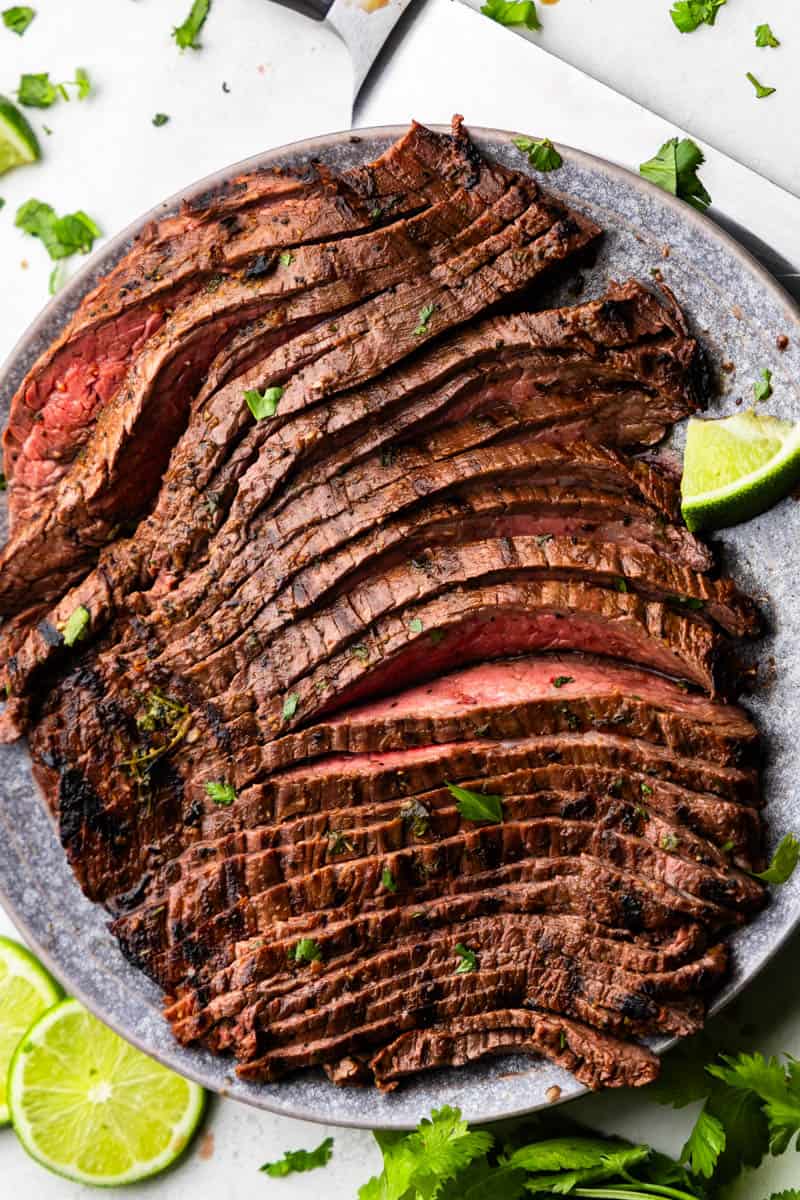
Slice Against the Grain
When cutting your meat, be sure to cut against the grain. It is quite easy to see the grain running through the meat in both of flank and skirt steak cuts. It looks like lines. Do not cut parallel to these lines, always cut perpendicular to them. The grain provides a natural breaking point in the meat. If you cut against them then you end up with tons of breaking points in each piece which keeps is what makes it tender.
Storage and Reheating Instructions
Refrigerate leftovers in an airtight container for up to 3 days.
Freeze before or after cooking in an airtight container or resealable plastic freezer bag for up to 3 months. Thaw in the refrigerator overnight before cooking or eating.
To reheat, use a skillet over medium heat and cook slices just until warmed through to retain tenderness. We don’t recommend microwaving.
More Mexican Favorites
Tacos Al Pastor
4 hrs 25 mins
Authentic Beer Braised Carnitas
2 hrs 55 mins
The Best Beef Barbacoa
3 hrs 10 mins
Homemade Beef Enchiladas
55 mins


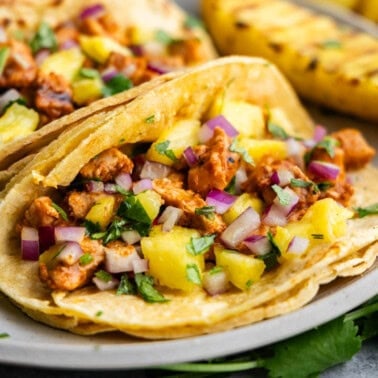
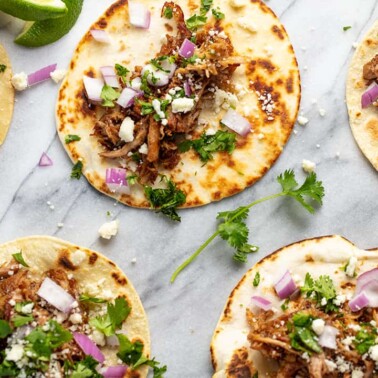
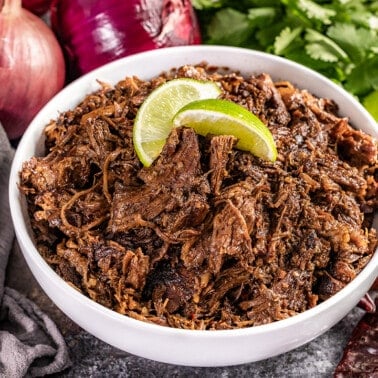
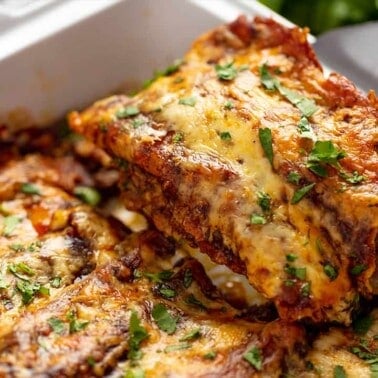
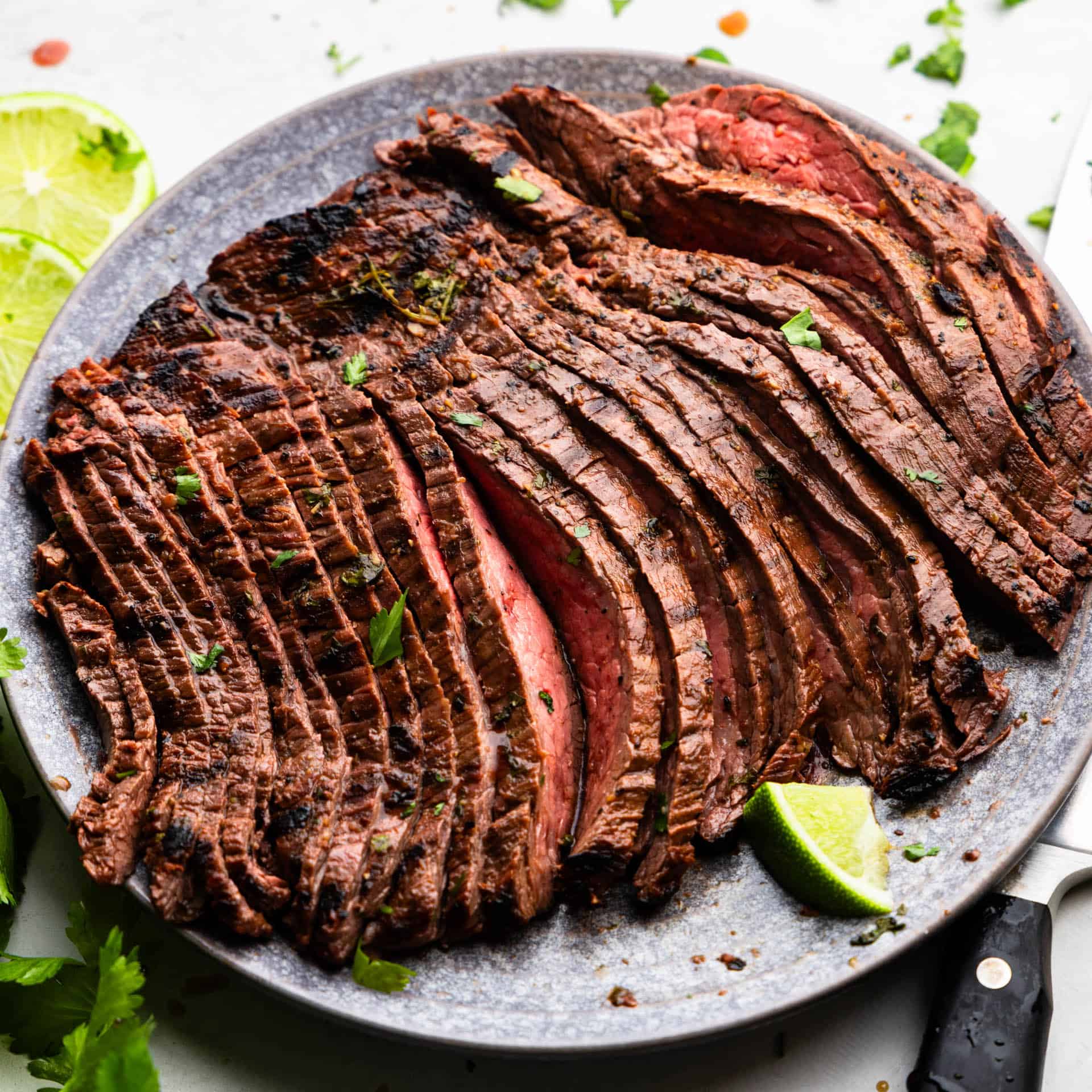
This is our go to recipe! We use it for beef, chicken and venison! It is so delicous and easy. To save chopping I throw it all in a bowl and use my emersion blender.
My son made this for us. So good! I am making it for my friends tomrrow. Hope its as tasty as his was. Thanks for the recipe & side dish suggestions.
My kids request this all the time. One of my kids doesn’t like fajitas but loves this recipe.
Awesome, marinated with rib eye steak overnight. Delicious
My brother in law made this and it was outstanding. Thank you Corey Knagges.
❤️ 😍 💖 ❣️ 💕
One of my husband’s favorite meals! He devours this every time I make it!
Made this for my daughter’s 60th birthday. Everyone loved it. Relatively easy to make.
I’ve been grilling and barbecuing for 53 years and I use this for fajitas every single time from the very first time I used it. HIGHLY HIGHLY RECOMMEND!!!
This is a fantastic recipe, there are never leftovers!
This is the 2nd time I’ve made this recipe. It is so easy and so yummy!!